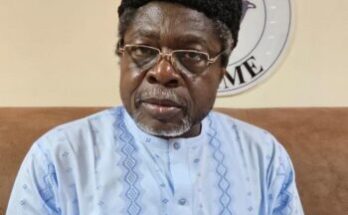A major feature of a modern state is, among other things, having the ability to effectively take charge of its internal affairs, including internal security, maintaining law, order and, above all, protect her territorial integrity and sovereignty. These can be achieved through diplomatic means, and if warranted, the option of military confrontation would not be ruled out. A sovereign country must have the wherewithal to repel external aggressors.
In their latest ranking, the Global Firepower, a US-based think thank, responsible for rating the military forces of all countries on the planet, which relies on 50 indices to fix the ‘PowerIndex-score,’ from weapon numbers to weapon diversity and natural resources. Which includes available industries to the workforce, individual capabilities, financial stability, logistical capability, and geography, ranked the Nigerian Military, 36th out of 142 in the world, and 4th in Africa.
With about 230,000 uniformed personnel, the Nigerian military, is among the largest combat force on the continent and had engaged in numerous UN-backed peace keeping operations in and outside the continent.
In order to complement the role of the military in safeguarding the country, the Nigeria Police Force, founded in 1930, to maintain and promote civil cohesion, while checkmating internal strife was able to grow its personnel to about 350,000, in 2023.
This is in addition to the ancillary activities of paramilitary outfits like, Civil Defense, Immigration, Customs, Correctional officers, etc. In the same vein, numerous covert and intelligence outfits like the DSS, NIA, and other specialised units abound, all in a bid to secure the country.
With Nigeria’s exponential population growth, experts are divided on the need to either expand the size of its security agencies, by recruiting more, and increase defence budget, or focus on capacity building and adopting new and modern technology, in security management.
Either way, increased defence budget is inevitable. But again, with a population of about 200 million, a combined security outfit, comprising military, paramilitary and police, etc, is put at a little over a million, certainly they have a hard time securing the entire Nigerian nation.
The vastness of the country led to an incredible rise in the number of ungoverned spaces across the length and breadth of the nation. Take, for instance, activities of armed bandits and terrorists on the fringes of the country’s borders and numerous forest in North-west, it will always prove difficult to subdue, due in part to geography and logistics. Same for the creeks in the remote riverine Niger Delta region, in the South-south, and the deep forest of the South-east.
Regardless of the intensity and multidimensional challenges, Nigeria should be wary of engaging non state actors, or hiring mercenaries or private military companies, to fight its war. Some weeks back, Alhaji Mujahid Asari Dokubo, the self-acclaimed militant leader, and head of the Niger Delta Volunteer Force, NDVF, stunned Nigerians when he revealed that his men drove armed bandits, and restored sanity at the Abuja-Kaduna expressway. Normally, one would be inclined to dismiss such claims as normal rabblerousing, from an attention-seeking Asari Dokubo. But the timing and place he made such statement got even the most doubting cynics to have a rethink.
Speaking to newsmen when he met with President Bola Ahmed Tinubu, he made the following statements: “There is a full-scale war going on and the blackmail of the Nigerian state by the Nigerian military is shameful. They said they do not have enough armament and people listen to this false narrative. They are lying. They are liars. I repeat, they are liars because I am a participant”.
He continued, “I am a participant in this war. I fight on the side of the government of the Nigerian state in Plateau, Niger, Anambra, Imo, Abia and Rivers. And in Abuja today, you are travelling to Kaduna on this road. It is not the army that makes it possible for you to travel to Abuja or travel to Kaduna, and vice versa. It is my men, employed by the government of the Nigerian state, stationed in Niger.
“Today, you travel to Baga, you go to Shiroro, you go to Wase. We have lost so many men and in all these engagements, we don’t even have one per cent of the armament deployed by the Nigerian military. military”, he said.
The Asari revelation came to many as a shock, and raised some fundamental questions. First, when were he and his men recruited, and what, if any, were the terms and conditions attached. Second, has the military, despite humongous budgetary spending, chickened out, or incapable of defending the country, which is their constitutional mandate?
Whatever the case, the Nigerian government should be wary of perilous mercenaries, and other private military companies and contractors.
Activities of private military companies, and other self-styled mercenaries, can be counterproductive. A big lesson is the recent Wagner’s mutiny in Russia. It shows just how flakey and unpredictable they can be. Take, for instance, the owner of the Wagner Group, Yevgeny Prigozhin. He owes everything he is to Vladimir Putin. As a chef in Moscow, his Concord catering firm was hired to provide catering services to the Kremlin, thereby making him blend freely with the high and mighty within the Russian oligarchs and elite. He won Putin’s confidence to the point he was integrated into the inner circle of power brokers, thereby building international networks. The creation of a private military company, Wagner, and the group’s fluidity and heroic feats during the Crimean crisis, in 2014, between Russia and Ukraine, was the highpoint of Prigozhin’s relationship with Putin.
He became the defacto foreign policy henchman and international strategist for the Russian leader. Their friendship transcends mere running errands for Putin. In 2016 and 2020, during the US elections, Mr Prigozhin coordinated an intricate network of internet trolls, known as the Russian Troll Farms. The aim of the farms was to influence elections across nations (including the US) perceived to be hostile to Russia and her interest. With such closeness, he was considered a reliable Putin’s ally, Prigozhin had a blank mandate to go international with his Wagner Group. His presence in some African countries like Mali, Central African Republic, Zimbabwe, Madagascar, Mozambique, Libya and lately Sudan, just goes to show how formidable their operations are, and the pattern and circle of conflicts they respond to, in return for cash and gold mines. Wagner’s successes in Syria, Ukraine and Venezuela were the launchpad they needed to announce their presence globally, as a formidable and ruthless non state actor, and private military company.
Buoyed by such remarkable and exceptional feat, Prigozhin decided to take on a bigger pie — Russian Ministry of Defence – and other top ranking members of the country’s security. His mutiny last Saturday remains a stark reminder and warning to President Tinubu to be wary of elements clothed in the fabrics of volunteers, or private military companies, such as Asari’s. If Prigozhin could turn on his benefactor, Putin, then it goes to show how careful one should be, especially when dining with the devil.
Nigeria needs to increase the size of its security personnel, no doubt. Monies and other logistics expended on signing private military contractors to take charge of our collective security should be used in recruiting thousands of unemployed youths in the country. At the moment, the number of security personnel sharply contrasts with the country’s population. Nigeria’s geographic firmament, which varies from region to region, makes it more pertinent to massively recruit thousands. During his campaign, the president promised to do just that. So far, he has proved to walk the talk. With the rejig and tweaking of the country’s service chiefs, and the appointment of the witty and incorruptible Nuhu Ribadu, as the NSA, it looks like the right template is set, to tame the rise in criminality across the country.
That the country is bleeding is an incontestable fact. According to several reports from reputable security watchdogs, over a hundred thousand Nigerians had died, in the last decade, due to lack of security.
But recourse to mercenaries, in whatever guise, is a call to anarchy. Similarly, over the last 10 years, billions of dollars has been expended on security, which includes weapons, logistics and training of personnel. However, in spite of such humongous spendings, insecurity still persist, as the military brass and political actors divert such monies into private use.
The new administration must wage a brutal campaign on security malfeasance. Once they can have the political will to do that, the security challenge in the country would have been solved by 50 percent. The other half will be based on kinetic military action. The cycle of corruption, especially in the security sector, must stop. Innocent Nigerians had paid the ultimate price. If the new administration continues on same threshold, many lives would still perish. At the moment, it seems sensible to, at least, shelve the idea of recruiting mercenaries and focus on building a robustly capable armed forces. If the mercenaries have any positives, consider the long term damaging consequence. At least, we can learn some lessons from private military companies/contractors like Blackwater in Iraq, Col Eeben Barlow’s Executive Outcomes, and, lately, Prigozhin’s Wagner.
Mohammed writes from the Department of Political Science and International Studies, Ahmadu Bello University, Zaria, Kaduna state, via [email protected]




